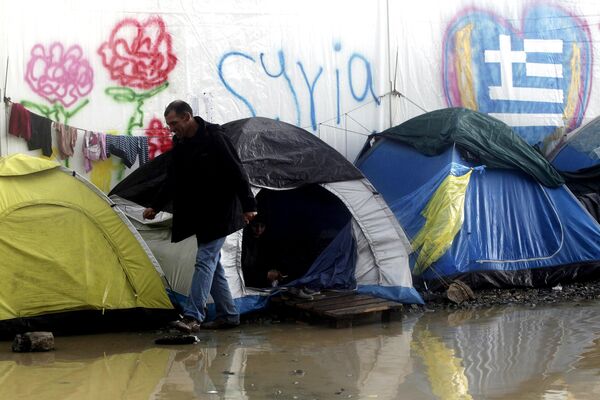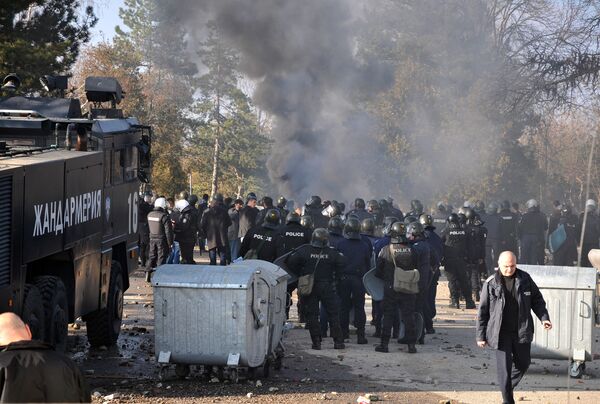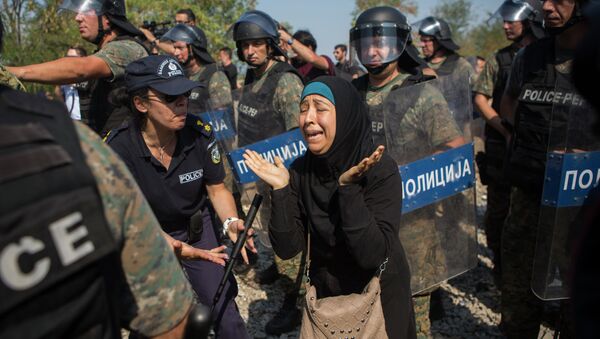The European Commission announced, Thursday (December 8), that member states could begin relocating migrants back to Greece — whence many of them originated after crossing the Mediterranean or the West Balkans — in order to reassert common immigration policy, which was thrown into chaos by the mass movement of migrants that overwhelmed the Athens authorities.

The move is seen as putting pressure on Greece to process migrants arriving on its shores — in line with the Dublin rules, which say all asylum seekers must be processed in the country of arrival — and stem the flow of migrants moving northwards through Europe.
The decision is likely to force Greece to send more "irregular migrants" — those refused asylum — back to Turkey, under the controversial EU-Turkey deal which has hit a series of setbacks — not least over disagreements over Ankara's failure to meet the terms of the agreement.
However, the move has been condemned by human rights campaigners, who say the conditions for refugees in Greece — particularly on the islands — are "dire".
"It seems that — for the European Commission — all roads for refugees lead to Greece. It is outrageously hypocritical of the European Commission to insinuate that Greece alone is to blame for dire conditions, when the overcrowding and insecure climate on the Greek islands are for the most part caused by the EU-Turkey deal, and compounded by the lack of solidarity from other EU countries to relocate people," said Iverna McGowan, Director of Amnesty International's European Institution's Office.
EC to restart #AsylumSeekers returns to Greece next yr. Yet conditions likely to remain dire under #EUTurkeyDeal https://t.co/phh9RDiadq pic.twitter.com/40t3WFE775
— Amnesty EU (@AmnestyEU) 8 December 2016
"Asylum-seekers on the Greek islands face overcrowding, freezing temperatures, lack of hot water, violence and hate-motivated attacks. While we have long called for reception conditions to improve, forcing refugees to stay on the islands only so that they can be returned to Turkey, in line with Turkey's interpretation of the deal, is inhumane. Pressure on Greece must be immediately alleviated, not increased," she said.
Commission Praises "Progress"
The Dublin rules — part of the Schengen borderless Europe regime — were thrown into disarray through 2015 when Greece (as well as Italy) was overwhelmed by the sheer volume of migrants arriving on their shores. The authorities were unable to deal with the numbers, which led to many thousands crossing the Greek border and moving into other EU member states with no immigration checks.
Progress made under the European Agenda on Migration: https://t.co/nN7w37PAU7 #migrationEU pic.twitter.com/yBplT2ImBn
— European Commission (@EU_Commission) 8 December 2016
European Commission First Vice-President Frans Timmermans praised "the progress made by the Greek authorities in rectifying deficiencies in the country's asylum system, which has allowed us to recommend the gradual resumption of Dublin transfers to Greece as of 15 March 2017."
"This will provide further disincentives against irregular entry and secondary movements, and is an important step for the return to a normally functionally Dublin and Schengen system," he said.

EU-Turkey Talks 'Frozen'
However, the EU-Turkey agreement for the relocation of migrants — many from Syria — back to Turkey has faced increasing opposition, as it is contingent on Turkish citizens being allowed visa-free access to Europe and the acceleration of Turkish accession into the EU.
The deal has faltered because Turkey has failed to meet a series of criteria set out by the EU — not least on human rights and freedom of speech. Opposition to the migrant deal grew after the crackdown on opposition groups, the media and civil servants following the failed coup, July 2016.
Help DiEM25 save Shabbir. Help Europe save its soul. Stop the EU-Turkey Deal! Join the campaign. https://t.co/MVOkOwkvMO
— Yanis Varoufakis (@yanisvaroufakis) 1 December 2016
In November, MEPs called for a temporary freeze on EU accession talks with Turkey, citing the "disproportionate repressive measures" under the state of emergency imposed following the coup.
Despite this, Timmermans said: "Our comprehensive European approach on migration is showing positive results. We can see this in the continued implementation of the EU-Turkey Statement and the dramatic decrease in the number of irregular migrants arriving in Greece."


